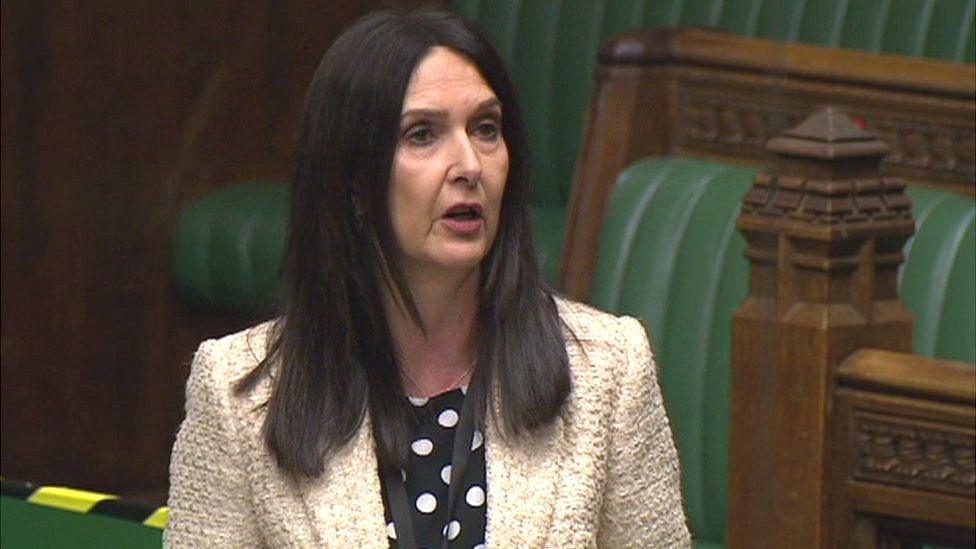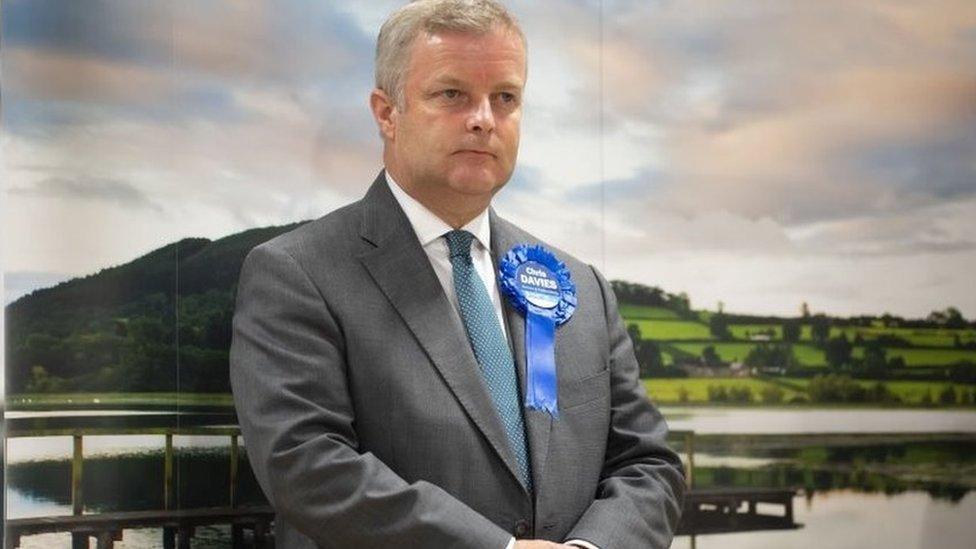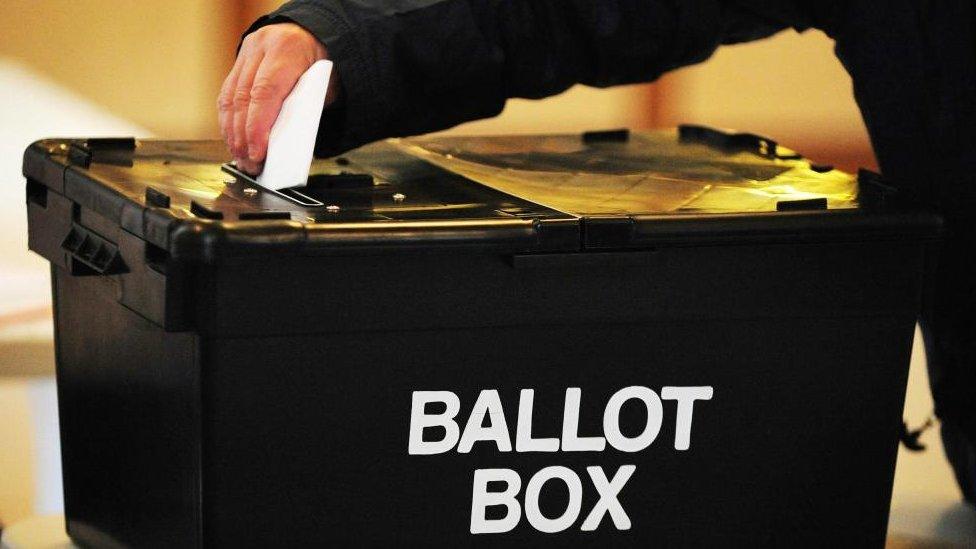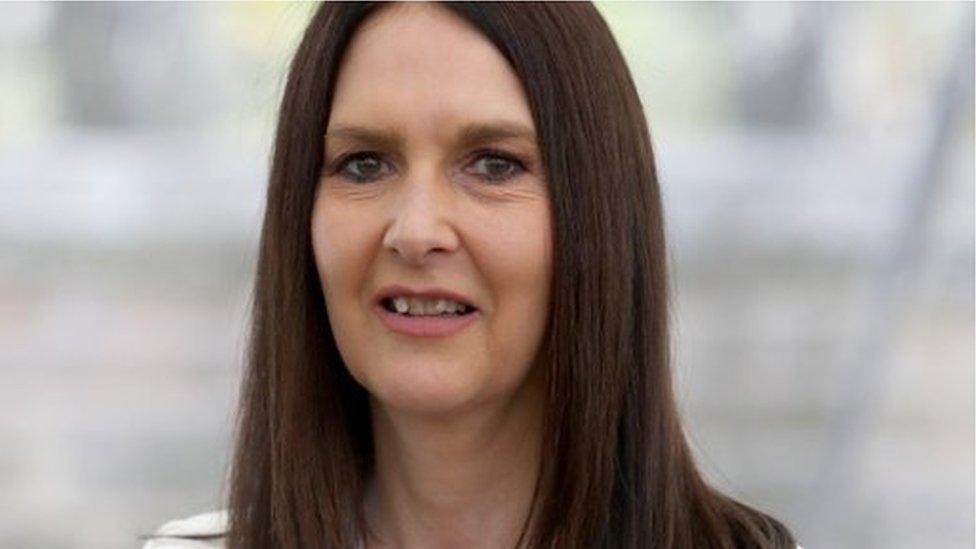What happens next in the Margaret Ferrier case?
- Published

Margaret Ferrier will appeal against the proposed ban
A crunch by-election looks likely in Scotland after MPs voted overwhelmingly to suspend Margaret Ferrier.
The MP for Rutherglen and Hamilton West broke pandemic rules by speaking in parliament while awaiting the results of a Covid test in September 2020.
After learning she had tested positive, she took a train home to Glasgow rather than isolating.
Her suspension could lead to a by-election - so what happens next and what does it mean for her constituency?
Will there be a by-election?
The Commons standards committee recommended in March that the MP - who was elected for the SNP but had been sitting as an independent - should be suspended for 30 days.
Ms Ferrier appealed the judgement, but it was later upheld, external when MPs voted by 185 to 40 in favour of the suspension on 6 June.
Any MP suspended for more than 10 days will face a recall petition.
If the petition is signed by more than 10% of eligible voters in the constituency within six weeks, the MP is removed from their seat and a by-election called.
South Lanarkshire Council has confirmed the Margaret Ferrier recall petition will be open from 09:00 on Tuesday 20 June to 17:00 on Monday 31 July 2023.
Constituents can sign the document at seven council sites across the area, external.
Applications to participate by post or by proxy can be organised by contacting the Electoral Registration Office, external.
The council has also confirmed that the number of Rutherglen and Hamilton West constituents entitled to sign the petition is 81,124 - so 8,113 people would have to sign to remove Ms Ferrier.
If this is successful, it is likely a by-election will not happen until the autumn.
Labour had already selected a candidate for a by-election before the Commons had even voted to suspend her, with the party quietly confident of winning the seat and adding momentum to its campaign ahead of next year's general election.
How do recall petitions work?
The recall procedure for MPs was introduced in 2015 in response to the MPs' expenses scandal in the run up to the 2010 general election.
MPs can be recalled under three circumstances:
if they are convicted of any offence and jailed or detained
if they are suspended for more than 10 sitting days (or more than 14 days if the sitting days are not specified) - which applies to Ms Ferrier
if they are convicted of making false or misleading parliamentary allowances claims
A petition officer then arranges for the petition to be open for six weeks.
According to House of Commons Library, external, electors can sign it in person at a signing station or by post or proxy.
If the 10% threshold is reached the petition officer informs the Speaker of the House of Commons - the seat becomes vacant when this notice is given.
Two MPs have been recalled through this process both in 2019 - Labour's Fiona Onasanya of Peterborough and Conservative Chris Davies of Brecon and Radnorshire.
Ms Onasanya, who lied to police over a speeding ticket, had been jailed for three months for perverting the course of justice.
Meanwhile, Mr Davies had pleaded guilty to two charges of making a false expenses claim.

Chris Davies had been an MP since 2015 but was unseated by a petition after admitting submitting two false expenses invoices
A recall petition was held in North Antrim in September 2018 over the DUP's Ian Paisley, but failed to get enough signatures.
The Commons had voted to suspend him for failing to declare two holidays paid for by the Sri Lankan government and lobbying on its behalf.
This will be the first recall petition held in Scotland.
People can campaign for or against recall petitions and the Electoral Commission has rules in place, external for spending and donations on such campaigns.
Voters who want to sign the recall petition will need voter ID because of new rules introduced by the UK government.
Who backed Ferrier in the Commons vote?
It had been suggested that some Conservative MPs might vote against the motion to ban Ms Ferrier as they are concerned about the precedent it would set in the case of Boris Johnson.
The former PM's behaviour is being looked at by Westminster's Privileges Committee over whether he misled parliament.
Of the 40 MPs who ultimately opposed her suspension, 32 were Conservatives, two were DUP, two were Alba - Neale Hanvey and Kenny MacAskill - and one was Reclaim.
The Conservatives who backed her included former ministers David Davis and Jacob Rees-Mogg, and party grandees Sir Bill Cash and Sir Edward Leigh.
Ferrier was accompanied in the Commons for the vote by Conservative former minister Andrew Selous and SNP MP Carol Monaghan.
At one point, Conservative MP Daniel Kawczynski was seen walking to the opposition benches to shake her hand.
Many of her former SNP colleagues had been calling for her to quit as an MP since her lockdown breach first came to light.
Related topics
- Published22 May 2023

- Published21 May 2023

- Published1 August 2023
